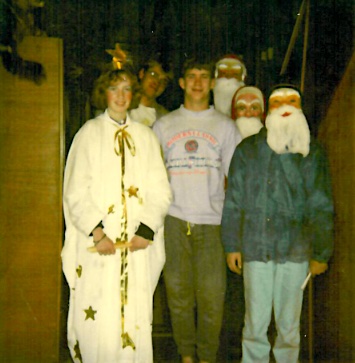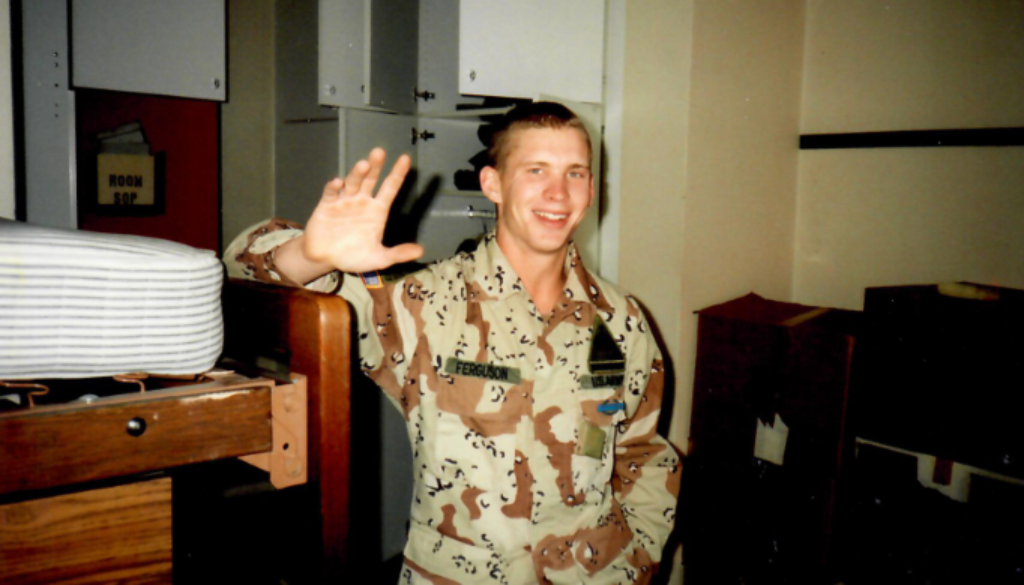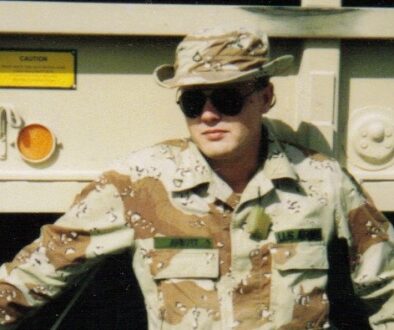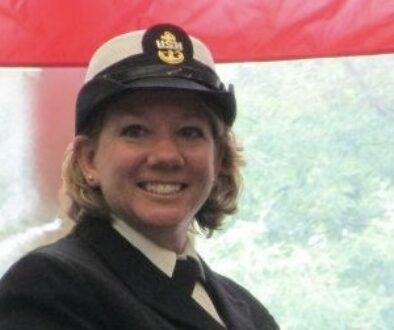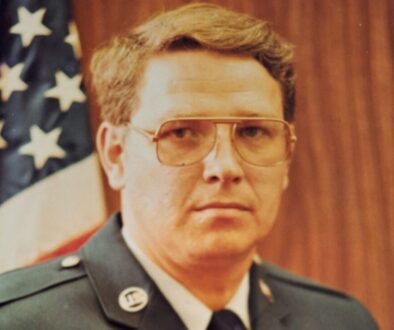Specialist Eric Ferguson, U.S. Army: From Film to Reality – A Soldier’s Service in Desert Storm
It’s an age-old question, does art reflect life or does life reflect art? In the case of Specialist Eric Ferguson, U.S. Army, one would have to say the latter. Eric has always drawn inspiration from the stories and larger-than-life heroes depicted on the silver screen. They inspired him to join the Army and be bold when choosing his warfare branch. They gave him insight and strength to deal with the difficult situations he faced in training and while part of the Operation Desert Storm mobile assault force in Iraq. Finally, they helped him understand and deal with the Gulf War’s aftermath. Now it is time for Eric’s story to do the same for others. This is his story.
Eric was born in 1971 and raised in Peoria, Illinois, a medium-sized town in central Illinois located about 160 miles southwest of Chicago and the home of Caterpillar, Inc. He was the oldest of five children with a stay-at-home mom and a dad who worked from home as a regional sales manager for the James River Corporation. Eric’s dad helped him cultivate a love of history in the second grade when Eric found a 1971 world atlas. Eric studied all the countries’ maps, drew their colorful flags, and memorized their capitals and population data. He also noticed some countries were divided, like Germany, Korea, and Vietnam, and asked his dad why. His dad explained about the wars and their outcomes and how they impacted America. He also explained the atlas’s pre-World War II maps of Poland, Germany, Japan, and the Soviet Union, and the great conflict that was World War II. From that point on, Eric was hooked on history.
When it came time for high school, Eric attended Richwoods High School, a public school in north Peoria. He played soccer during his freshman year, but was more interested in history, comic books, and art, so he elected not to play sports in subsequent years. He was particularly fascinated by the 1970 movie Patton, watching it so many times he had most of the dialogue memorized. A close second was the 1980 movie The Big Red One, which told the story of soldiers in the First Infantry Division during World War II. These movies, together with a number of high school teachers who told Eric and his classmates about their experiences during the Korean and Vietnam Wars, planted the seeds of military service.
As high school graduation neared in the spring of 1989, Eric’s dad asked him what he was going to do after he graduated. He told Eric he couldn’t afford to pay for him to attend college and that they were going to need to move Eric’s sister into Eric’s room, so he needed to come up with a plan for what he was going to do. The conversation surprised Eric because he hadn’t given his future much thought other than he knew he wanted to go to college. With no way to pay for it, he looked to the military and its GI Bill benefits to pay his way through school. Several of his friends had already enlisted in the Marines and others had joined the other services, so Eric decided to follow-up previous contacts he’d had with a recruiter and give the Marines a try.
The Marines appealed to Eric because he considered them an elite service and because he enjoyed the 1986 movie Heartbreak Ridge about a tough Marine Gunnery Sergeant. When Eric spoke to the Marines, a squared-away recruiter promised the Marines would give Eric honor and courage. After his meeting, Eric started to leave the building and an Army Staff Sergeant approached him and asked what the Marines had promised him. Eric told him honor and courage. The Staff Sergeant told him the Army could promise him honor and courage plus the Army College Fund and the GI Bill. With these benefits and the Illinois Veterans Grant covering tuition at any Illinois public university, Eric would have enough money for college. Even better, the Army would allow him to specify that his first assignment would be in Germany, where a good friend from high school was also headed.
With those details agreed upon, the Staff Sergeant had just one question – what military occupational specialty (MOS) do you want? A line from the movie Patton drove Eric’s answer. During Patton’s famous speech at the beginning of the movie, he told his troops, “Thirty years from now when you’re sitting around your fireside with your grandson on your knee, and he asks you, ‘What did you do in the great World War II?’ — you won’t have to say, ‘Well, I shoveled shit in Louisiana’.” Eric knew if he was going to join the Army, he had to be all in just like Patton said, so he told the Staff Sergeant “I want to be in the infantry.” He signed the enlistment contract in April just after turning eighteen and made it official – he would report for Basic Training in August.
A couple of days later, one of Eric’s uncles came to the house to visit. The uncle had served in the Marines in both Korea and Vietnam and been awarded the Bronze Star. Eric told him he had joined the Army and his uncle said he should have joined the Marines. Then he hugged Eric and said he was proud of him – something Eric never forgot.
After Eric graduated from high school in May 1989, his family took what would be their last vacation together as a whole family at Disney World in Florida. When they got back, it was time for Eric to say goodbye. On August 15, 1989, he took a bus from Peoria to the Military Entrance Processing Station (MEPS) in Chicago, where he was formally inducted into the Army. One of the first things he noticed was the sergeants he was now dealing with weren’t like the Staff Sergeant that recruited him – these sergeants were stern. That’s when reality set in that he was in the Army now. After completing everything at the MEPS, he boarded a plane at O’Hare Airport and flew to Atlanta’s Hartsfield Airport, where he and the other newly arriving recruits loaded onto a bus headed for Basic Training at Fort Benning, Georgia.
Once at Fort Benning, Eric and the other new recruits began in-processing at the Arrival Station. They were issued uniforms which smelled so heavily of mothballs that even today, whenever Eric smells mothballs, it brings back memories of in-processing at Fort Benning. A sergeant also began handing to each recruit a uniform patch associated with the division they would be assigned to after completing their training. He began by handing out the Tropic Lightning patch of the 25th Infantry Division, headquartered at Schofield Barracks on Oahu, Hawaii. When he handed Eric the patch, Eric said, “Sergeant, I’m supposed to be going to Germany.” The sergeant asked Eric to show him where it said that in his enlistment contract. Having just come from the MEPS in Chicago, Eric produced his contract and showed it to the sergeant. The sergeant said “okay” and handed Eric a patch for the 2nd Armored Division, whose forward element was headquartered in Garlstedt, Germany.
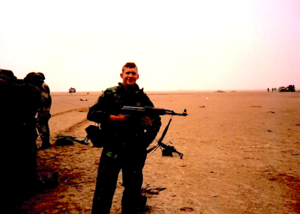
Eric was thrilled with the thought of being assigned to the 2nd Armored Division. Not only was the division’s forward element in Germany as he had been guaranteed, but it also was the “Hell on Wheels” division previously commanded by General George Patton at the start of World War II. Unlike other divisional patches which were sewn onto the uniform’s left shoulder, the 2nd Armored Division patch was sewn on the uniform over the heart. If anyone challenged unit members on their divisional patch location, they simply responded “Patton said we could put it there”. Moreover, the assignment meant Eric would serve in one of the units commanded by General Patton, tying back to the movie Patton, one of his greatest inspirations for joining the Army.
After issuing the recruits their uniforms and their divisional patches, the Arrival Station staff told the recruits they could only keep what the Army gave them. They were not permitted to keep food of any kind, reading material other than a Bible, or cigarettes. In fact, smoking was prohibited, as was drinking soft drinks like Coca-Cola or eating candy, chips or anything else that tasted good. They were also issued a book with three standing orders they had to memorize.
Later that first night, Eric was going through his gear and found a pack of cigarettes. Terrified he would be found with the contraband, he knew he had to dispose of it. Having seen the 1987 Stanley Kubrick film Full Metal Jacket and acutely aware of its Marine boot camp scenes, Eric didn’t want to throw the cigarettes into the trash because he was afraid the instructors would find them and he and everyone else would get in serious trouble. He solved the problem by going into the latrine late that night and stuffing them down the toilet. His Army experience was off to a rocky beginning and Basic Training hadn’t even started yet.
Basic Training began as Eric and the other recruits were herded onto a truck trailer they dubbed “the cattle car” to go and meet their drill sergeants. Eric boarded with his gear first and was followed by about fifty others, pressing Eric to the back. When they arrived at their destination, the drill sergeant shouted they had sixty seconds to get out and into formation and that they had already wasted fifty seconds. Eric struggled to get out and into formation. Once the recruits formed up, the drill sergeants lit into them, telling them to drop and “beat your face”, meaning do pushups. They were told to look straight ahead, but when a drill sergeant starting yelling at a recruit, the man next to him invariably glanced over to see what was happening. The drill sergeant’s watchful eye missed nothing and he would call out the curious recruit, soon having him doing pushups for “rolling his eyes” and “insubordination”. And so, the drill sergeants moved down the line, engaging every recruit who made the slightest unacceptable move, whether voluntary or involuntary. Eric, still with visions of Full Metal Jacket in his head, stared straight ahead and managed to avoid their wrath, at least for now.
Eric was assigned to Alpha Company of the 3rd Battalion, 32nd Infantry Regiment. The regiment was established in Hawaii in 1916 and dubbed “The Queen’s Own” regiment by Hawaiian Queen Liliuokalani, so every time Eric and the other recruits rendered a salute, they had to bark out “Queen’s Own.” This, along with every other element of Basic Training, helped develop esprit de corps among the recruits, transforming them from an undisciplined bunch of civilian teenagers into a cohesive fighting unit. This was particularly important for Eric’s training company because instead of going their separate ways to various units across the Army at the end of Basic Training, Eric’s company would graduate and report as a cohort to a single operational unit. From Eric’s perspective, the strategy worked as the bonds he built with his fellow recruits during Basic Training and follow-on training were very strong. To this day, the names and faces of his Basic Training company are etched in his memory.
Everything about Basic Training was intense. Eric woke at 5:00 a.m. and marched to physical training. Then it was off to breakfast, followed by training, lunch, more training, dinner, more training, and finally lights out at 11:00 p.m. The days were so physically demanding, Eric was tired all the time and, because he could only eat what was served to him at “chow”, he was always hungry. Once when he had duty serving chow, he learned two soldiers had gone to sick call and missed the meal. That meant there were two extra chicken fillets and Eric stuffed them into his pocket and ate them later that night. On another occasion – the night before the physical fitness test consisting of push-ups, sit-ups, and a two-mile run – the recruits were told they could order pizza to get some extra carbs for the test. Eric ordered two large pizzas and ate them both himself! Even with all that in his stomach, he passed the physical fitness test the next day.
Eric’s insatiable appetite did get him into trouble once. During a surprise 4:00 a.m. footlocker inspection, a member of the inspection team found an orange and a magazine in Eric’s locker. The inspector called out, “Look at this, Drill Sergeant, it’s an orange, and a magazine, too!” Scenes from Full Metal Jacket again flashed through Eric’s mind. The drill sergeant replied, “Holy shit, Ferguson’s got an orange!” The drill sergeant did not, however, pursue the magazine because it was Catholic Today, which he apparently considered close enough to the Bible to be okay. Still, he had the orange and that was all he needed. The entire platoon paid for Eric’s infraction and similar infractions by other recruits by doing extra physical training throughout the day.
Despite enduring punishments for other’s infractions, the members of Eric’s platoon helped each other succeed. Eric, for example, had never fired a weapon before arriving at Basic Training because his father didn’t want any firearms in the family. That made rifle training a weak spot for Eric. In fact, he was not good at it at all. A recruit from Oklahoma jumped in and taught Eric how to shoot. Eric attributes his rifle qualifications to the help and instruction he received from his fellow recruit.
Although the drill sergeants were demanding, Eric found them uniformly good and believed they provided the training he and the other recruits needed to succeed in the Army and survive in combat. He particularly admired his drill sergeant. Like the others, Eric’s drill sergeant was particularly concerned with keeping his recruits safe. They were always permitted to get water if they needed it, no questions asked. When a recruit in another platoon tried to commit suicide by overdosing on Tylenol, Eric’s drill sergeant sat down all the men in his platoon and assured them they could make it through Basic Training. Still, the stress proved too much for some. Eric actually heard the gunshot when a recruit in Delta Company of the 2nd Battalion, 58th Infantry Regiment, died by suicide. Afterwards, the recruits were instructed to call home to reassure their parents that they were okay, that the Basic Training wasn’t like the boot camp scenes in Full Metal Jacket, and that they should not call their Congressional representatives as that would only make things worse.
Basic Training lasted eight weeks. For many in the other military services, graduation from boot camp was a big deal because it meant going to a school at another installation to learn a specific job or warfare skill. Not so for the new soldiers in Eric’s training company. Because they trained as a cohort, the transition between Basic Training and Advanced Individual Training (AIT) for Infantry was seamless. The new soldiers stayed at Fort Benning in the same barracks, kept the same drill sergeants, and continued to live under the same restrictions. The only difference was they could now wear a hat with their uniform, allowing them to be identified by others as new soldiers rather than raw recruits.
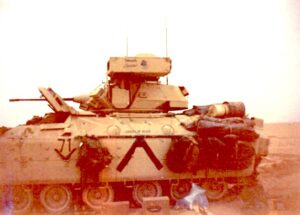
Infantry training lasted about six weeks and further transitioned into training on the M2 Bradley Fighting Vehicle, a tracked armored personnel carrier equipped with a turret-mounted twenty-five-millimeter chain gun, two TOW anti-tank missiles, and a 7.62-millimeter machine gun. In addition to a crew of three, the Bradley held six fully equipped soldiers able to disembark the vehicle and press an attack on foot. The 2nd Armored Division had been using the Bradley since it was first introduced to U.S. combat units in March 1983.
Eric completed Bradley Fighting Vehicle training in early December 1989. He took leave to visit his family in Peoria and then left before Christmas to report to the 2nd Armored Division (Forward) in Garlstedt, Germany. With the Berlin Wall having fallen just the month before, he was a little apprehensive about what his new assignment might bring. Still, he knew he was reporting to Germany at a significant time in European history and he intended to make the most of his assignment.
Eric arrived at the Army’s Lucius D. Clay Kaserne in Garlstedt, along with over 200 other members of his training company, just before Christmas 1989. The Lucius D. Clay Kaserne was one of only two U.S. Army facilities in the British occupied zone of West Germany. The soldiers in the 2nd Armored Division (Forward) joked that the base, which was activated in 1978, served as a speed bump in the event the Soviet Union attempted to attack only the British and French zones of West Germany. That meant Eric was truly at the pointy end of the spear should the Cold War with the Soviet Union ever turn hot.
Since Eric’s training unit reported as a cohort, the intention was to assign everyone to the same unit. However, with so many new soldiers reporting at the same time, one unit could not accommodate them all. Accordingly, Eric and about half of the cohort were assigned to the 1st Battalion of the 41st Infantry Regiment (1st/41st), a mechanized infantry battalion commanded by Lieutenant Colonel James Hillman and part of the 2nd Armored Division (Forward). The remainder of the new soldiers were split among various units across the American zone in southern West Germany, including the 1st and 3rd Armored Divisions. Although Eric was sad to see the others go, he was glad he got to stay with the bulk of his cohort. These soldiers formed the backbone of his social network throughout his assignment in Germany.
When Christmas Day came, Eric fell through the cracks. He was so new, no one invited him to spend Christmas Day with them. Instead, he spent most of the day alone in his barracks room. All the other new soldiers were invited to someone’s house for the holiday, but somehow, Eric got overlooked. Although it was hard for him at the time, Eric believes the experience made him stronger when he later had to experience separation from family and friends.
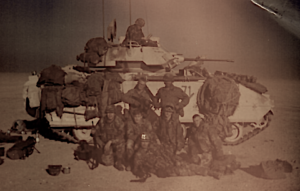
After Christmas, Eric was assigned to the 3rd platoon of Alpha Company of the 1st/41st. Alpha Company’s motto was “Strike Force” and the 1st Battalion’s motto was “Straight & Stalwart”, which Eric now announced every time he saluted. He initially attended “HOW School”, short for “Hell on Wheels School”, to acclimate him to life in Germany, teach him some basic German phrases (“nichts, nein, to the bahnhof, mit pomme frites”), and help him learn to think in kilometers rather than miles. He also got to experience routine liberty for the first time, as he was generally off on weekends whenever his unit was not conducting training. Garlstedt was just twenty miles north of the city of Bremen, which offered bars, discotheques, unique German music, and even more unique German beer.
One bar in Bremen Eric frequented, the Bier Akademie, became known as the American bar. It was open to U.S. soldiers twenty-four hours a day, seven days a week. British soldiers were welcome, too, but it was definitely the bar for U.S. soldiers. The bar was particularly important for U.S. soldiers as not all bars welcomed them, nor did all bars welcome British soldiers because they were viewed as the occupiers.
Eric’s first training with Alpha Company took place in February 1990. As a mechanized infantry company, Alpha Company operated thirteen M2 Bradley Fighting Vehicles divided among three platoons. Each platoon had two infantry squads and each squad operated two Bradleys. The squads were further broken down into teams, with each team being assigned one of the Bradleys. Eric was his team’s “SAW” gunner, which meant his weapon was a light machine gun known as the M249 Squad Automatic Weapon, or “SAW”. Given the importance of getting this weapon into the fight, Eric sat in one of the two seats closest to the exit ramp of his Bradley so he could dismount quickly and establish his position outside the vehicle. The other members of the Eric’s infantry team were armed with M16A2s and M203 grenade launchers.
Alpha Company trained at the British base in Bergen, near what had been the Bergen-Belsen prisoner of war camp and concentration camp. Eric could see evidence of the Nazi atrocities there, including the graves of POWs and Jews killed at the camp during World War II. Some of the buildings still had bullet holes in them, remnants of the war. The Bergen training range itself was large and Alpha Company used it to conduct maneuver training in their Bradley Fighting Vehicles at the squad, platoon, and company levels. Eric also conducted live-fire training with his SAW, however, during one such live fire exercise, his earplugs fell out and the noise from the machine gun was so loud, it deafened him. He didn’t realize it until he saw some of his friends laughing at him because he was talking loudly but he couldn’t hear them or anything else. It took him a week to regain his hearing, so he was careful about his earplugs going forward.
The unit returned to Garlstedt after completing the two-week training at Bergen, giving Eric an opportunity that had positive lifelong consequences. He had learned in January his grandmother had passed away but had not gone home for her funeral. Recognizing Eric’s loss, his company let him and one other soldier participate in a farm program, where they each went to live and work with a family for a week on a German farm in the village of Sothel. The farm Eric worked on was owned by Werner and Anne Mahnken, who tended the farm with their sons, Clemens and Kester, and one employee, Rudi.
Eric made lifelong friends participating in the farm program in Sothel, not only during this initial week, but also on the multiple other times he participated over the course of his tour in Germany. The farm visits allowed him to meet German families and experience their customs and how they lived their daily lives. He met German people who had lived through World War II, including some who remembered the British Army coming through their farms and old German soldiers who were veterans of the Battle of Stalingrad. He also learned farming was physically demanding work. During his February farm visit, the Mahnkens were focused on readying the farm’s equipment for the upcoming planting season. Eric helped by feeding the calves, leading the cows out to pasture, and shoveling manure in the barn. Again, Patton’s words came back to him. He had joined the infantry to avoid “shoveling shit in Louisiana” and now he was shoveling manure in Germany. He could only laugh at the irony.
In March 1990, Alpha Company again went on maneuver training, this time for six weeks at the U.S. Army Grafenwoehr and Hohenfels training areas in Bavaria. These two training complexes, the largest available to the U.S. Army in Europe, allowed Alpha Company and the rest of the 1st/41st Infantry Regiment to train together with M1 Abrams tanks from the 3rd Battalion of the 66th Armored Regiment, something that would prove crucial in the months ahead. As with the training at Bergen in February, Eric and the other soldiers lived in tents and had few distractions from their training tasks. Every now and then, though, they were permitted to have a beer or two, and spades tournaments were immensely popular in the evenings. There was also a day trip where Eric went with other soldiers to the former Nazi concentration camp at Dachau. Eric visited the memorial and a museum, which made a lasting impression on him. To this day, he can still picture in his mind the horrifying photograph of a prisoner the Nazis used in high altitude experiments.
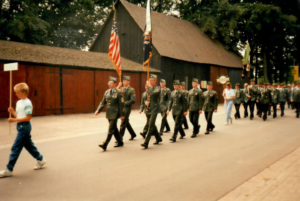
After the training at Grafenwoehr and Hohenfels, Eric and the rest of Alpha Company returned to Garlstedt. Eric roomed with another single soldier in the barracks and started every day at 5:30 a.m., followed by physical training from 6:00 to 7:00, breakfast, first formation at 8:00, and then day-long training. He took every opportunity to participate in the farm program and even marched with fellow participants in the Sothel Schuetzenfest (shooting festival) parade, which was fun because schuetzenfests are very popular in rural Germany. All in all, it was a great summer away from his military duties, meeting lots of German men and women his age, learning about their culture, and working hard on their farms.
In July, Eric and three of his friends decided to drive to a concert featuring numerous famous artists playing music from Pink Floyd’s album The Wall at Potsdamer Platz in Berlin on July 21. To get there, they had to pass through Checkpoint Alpha into the corridor leading to Berlin through Russian occupied East Germany, pass through Checkpoint Bravo into West Berlin, and ultimately arrive at Potsdamer Platz, which had been bisected by the recently defunct Berlin Wall. Despite not having all the paperwork they needed for the trip, they made it to the concert, joining 350,000 other concert goers at the event. While there, Eric broke off a piece of the Berlin Wall for a souvenir and was interviewed on Italian television for doing so. Even more incredible, the Band of the Combined Soviet Forces in Germany and the Red Army Chorus performed one of the Pink Floyd songs, Bring the Boys Home. The trip gave Eric the chance to see just how degraded the Soviet and East German forces had become. In fact, he bought uniform parts from Soviet and East German soldiers and shipped them home to Illinois for souvenirs. After the concert, he managed to find his high school friend who had recommended he join the Army and take an assignment in Germany.
On August 2, 1990, shortly after Eric and his friends returned to Garlstedt, Iraq stunned the world by invading Kuwait. In response, the U.S. began Operation Desert Shield, building a coalition of allies to eject Iraq from Kuwait if Iraq did not withdraw on its own. Because the 2nd Armored Division’s mission was protecting Germany and other NATO allies from Soviet attack, Eric and his fellow soldiers believed this was a war they would sit out and watch on the news. In fact, in late October 1990, Eric got called to the First Sergeant’s office to talk to his mother, who was worried because Eric hadn’t called home recently. His mother had initially called the Pentagon but got routed to Eric’s command in Germany. The First Sergeant told Eric to tell her he was fine and that he was not deploying for the war. Then, a couple of weeks later, on November 8, 1990, President Bush announced the 2nd Armored Division was deploying to Saudi Arabia to support Operation Desert Shield.
The President’s announcement changed Eric’s life. From November 9, 1990, until he returned to Germany on May 9, 1991, after participating in Operation Desert Storm, he worked every day without a day off. His preparations for the upcoming deployment included attending an abbreviated two-week combat medic training course where the attendees practiced giving IVs to one another. Despite the intense schedule, Eric was able to have Thanksgiving dinner with his team leader’s family, and was invited to celebrate Christmas with the Mahnkens, the German farm family he’d worked with. He particularly enjoyed seeing how the Mahnkens celebrated Christmas. Instead of lights on their Christmas tree, they had real candles, and they all joined in singing German Christmas carols together. The occasion had such a profound effect on Eric that he still has books of carols from Germany and uses them to sing carols on Christmas with his own family every year.
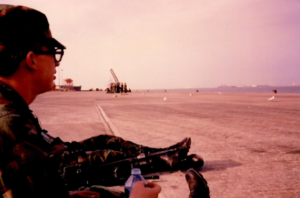
Eric and the rest of Alpha Company deployed to Saudi Arabia on January 9, 1991. They were bivouacked in a warehouse at the port of Al Jubail in the Persian Gulf, where they waited for their Bradley Fighting Vehicles and other equipment to arrive by ship. On January 17, a siren announced the air war against Iraq had started as Eric stood in line at the chow hall. Out of concern the Iraqis would fire SCUD ballistic missiles armed with chemical weapons at U.S. and allied forces, Eric and the other soldiers in Al Jubail wore Mission Oriented Protective Posture (MOPP) gear during all their daily activities. The gear consisted of boots, a protective suit, rubber gloves and, when MOPP Level Four was declared, a gas mask. Dressed in his MOPP gear, Eric helped unload the 2nd Armored Division’s equipment when it arrived, driving Bradleys, Humvees, and other military vehicles from the ship and positioning them for their upcoming mission.
Once all the vehicles arrived, including the M1 Abrams tanks assigned to the 3rd Battalion of the 66th Armored Regiment that would accompany the 1st/41st Infantry Regiment into combat, Eric and his unit deployed to somewhere in the Saudi desert near the border with Iraq. As he was a private (E-3) at the time, Eric had no idea where they were. What he did know was Alpha and Delta Companies of the 1st/41st Infantry Regiment were paired with Charlie and Delta Companies of the 3rd Battalion, 66th Armored Regiment and other Army units to form Task Force 3-66 Armor, allowing Alpha and Delta Companies’ mechanized infantry units to operate closely with the M1 Abrams tanks of the 66th Armored Regiment’s 3rd Battalion. For the same reason, Bravo and Charlie Companies of the 1st/41st were paired with Alpha and Bravo Companies of the 3rd Battalion, 66th Armored Regiment, and other Army units to form Task Force 1-41 Infantry. Both task forces operated as part of the 2nd Armored Division (Forward), which for the purposes of Desert Storm was operationally assigned to the 1st Infantry Division. For Eric, this was a full-circle moment because not only was he part of Patton’s 2nd Armored Division, but he was also part of the Big Red One. The two movies that had inspired him to join the Army, Patton and The Big Red One, had become his reality.
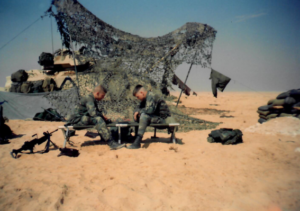
With no television or access to the news, Eric’s perspective on the buildup to the ground war against Iraq was limited to his daily training and what he could see with his own eyes. After dark with night vision goggles on, he watched everything “turn green” and listened to the explosions as bombs dropped by coalition aircraft pummeled Iraqi positions across the border. The bombing continued around the clock and Eric was glad he was not on the receiving end of the coalition air attack. He was also surprised by how cold it was in the desert at night. Thinking it would be hot all the time, he had not packed his sleeping bag with his gear. Until he obtained one, he stayed in his tent-covered foxhole at night, lighting a candle inside to stay warm.
The desert cold wasn’t the only threat in the days before to the ground war. With so many men armed and ready for combat, accidents were bound to occur. Eric learned this firsthand when he looked for a place to sit with a tray of hot food. He saw a rock that looked like a good place but decided for some unknown reason to sit on the ground to the left of the rock rather than on the rock itself. Moments later, a soldier in another company misfired his machine gun and the bullets whizzed by Eric’s head. Had he sat on the rock, the bullets would have killed him.
As part of his combat load, Eric was issued five grenades to carry with him during the coming assault. Not only did he not have anywhere to stow them because he already carried the SAW, but he also noticed they did not look like the grenades he had trained with. This caused him concern as mistakes with grenades often prove deadly. He looked at the box they came in and it indicated the grenades were manufactured in 1960. This did not fill him with confidence as he wondered what might happen when he pulled the pin from a thirty-year-old grenade. He made room for the grenades in his butt pack and hoped he never had to find out.
Although Task Force 1-41 Infantry, which included some of Eric’s good friends from Basic Training, made an incursion into Iraq on February 15 to scout Iraqi positions, Eric’s and the rest of the coalition’s ground war did not begin until February 24 when U.S. and allied ground units streamed across the border into Iraq. With their colonel’s rallying cry “for better or worse, we’ll have one or two or twelve beers upon our return” fresh in their minds, Eric and the other members of his company loaded into their Bradley Fighting Vehicles, dressed in MOPP gear and fully armed for combat. To ease the tension, they listened to music on their Sony Walkmans. When they reached the border between Saudi Arabia and Iraq, Eric’s vehicle climbed a defensive berm and began to come down the other side, only to stall out due to throttle problems. The platoon sergeant yelled, “Get this thing going,” and soon they were back on their way with the rest of Alpha Company and Task Force 3-66 Armor. Eric tried to look through peepholes in the Bradley’s troop compartment to see what was going on outside but couldn’t see anything. Then, the Bradley’s 25-millimeter chain gun began firing and Eric thought to himself, “this shit is real,” especially given that things being fired at typically fire back. For the next 100 hours, Eric and his team drove further and further into Iraq with Task Force 3-66 Armor, clearing Iraqi bunkers and foxholes, taking Iraqi prisoners of war (POWs), and stopping for quick breaks to eat or relieve themselves in the desert.
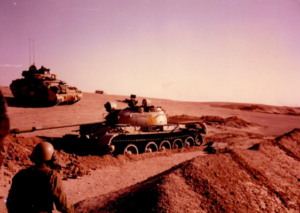
The Iraqi POWs Eric’s company captured were scared, hungry, and thirsty. One group of eight hadn’t eaten in two weeks and was grateful to be captured. Their AK-47s were rusted and broken and their other equipment old and in poor condition. Eric’s company took another group into custody just before the cease fire began. They, too, were hungry and scared. Some even had no boots. They did have Iraqi-made cigarettes, which they willingly traded, and thousands of dollars in Kuwaiti currency, which was confiscated. The one word they all repeated was “salaam”, which means peace in Arabic and is a gesture of greeting or respect. Seeing the prisoners reminded Eric of a movie he had watched in the 1980s, Lion of the Desert starring Anthony Quinn, about the Italian occupation of Libya prior to World War II and the Arab guerrilla fighters opposing it. Eric’s recollection of the movie and his interaction with the POWs made him realize his enemies on the battlefield were people just like him. They didn’t want to die fighting in the desert any more than he did.
On two occasions during the advance, Task Force 3-66 Armor halted to let other units pass by. The first time, it was to allow two brigades of the U.S. 1st Infantry Division move forward. Eric watched in awe as the long line of U.S. tanks, Bradley Fighting Vehicles, and Humvees paraded by on their way to war. The powerful show of force gave Eric a personal sense that he, standing in his boots on the desert in Iraq, was at the tip of the President’s foreign policy, shaping world events and advancing U.S. interests.
The second occasion involved the British 1st Armored Division. Like the U.S. 2nd Armored Division, the British division had a storied past, having fought in World War II in France, North Africa, and Italy. The Brits moved right through Eric’s company’s position, so Eric had the opportunity to observe how they used scouts on motorcycles to herd the division’s vehicles through the desert. Eric even spoke to one of the motorcycle scouts when he stopped near Eric’s position. He could see the Brits’ high spirits as they drove by, waving to their American allies and ready to take on the Iraqis. At dusk the same day, Eric saw Apache helicopters off in the distance in what appeared to be the attack mode and he hoped the helicopters had not mistakenly attacked the British forces. The Brits were indeed the victim of accidental friendly fire attacks on February 26 and 27, 1991, but Apache helicopters were not involved in the incidents. The incidents claimed the lives of nine British soldiers and wounded sixteen more.
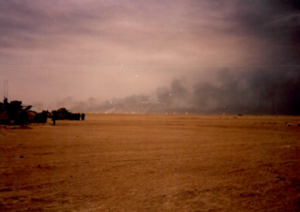
Desert Storm combat operations ended with a cease fire at 8:00 a.m. on February 28, 1991. Eric and the rest of Task Force 3-66 Armored were somewhere in Iraq when the time arrived. They found abandoned Iraqi equipment everywhere. They also saw black smoke billowing from at least twenty oil rig fires set by the retreating Iraqis before the cease fire took effect. As they had outrun their supply line and were low on water, task force units had to practice strict water discipline because they didn’t know when they would be resupplied. The barren desert landscape and the water shortage reminded Eric of the 1984 movie Dune about an arid sand-covered planet where water was more valuable than gold. Despite the harsh conditions, Eric was happy the war was over and that he had survived.
Although hostilities had ended, Eric’s company continued to advance until they arrived at Um Qasr, a port city in southern Iraq just across the border from Kuwait. Eric’s position was set up just in from the coast, where he could look across a minefield and see the Persian Gulf. There they were instructed to destroy any captured Iraqi weapons, including any American-made weapons used by the Iraqis. Some of the weapons proved hard to destroy, working even after being blown up as part of a pile. Many task force soldiers looked for AK-47s to take home as souvenirs, but the battalion commander made it clear no one could take any automatic weapons out of Iraq. The other plentiful items the soldiers found were official photos and paintings of Saddam Hussein. These were gathered and used for target practice on the firing range.
At some point after the cease fire, Eric’s company was assigned a position outside a nearby village. The village was still a hotbed of activity especially at night, apparently part of the longstanding Sunni/Shiite conflict in southern Iraq. When the company’s Bradleys were called away for some reason, Eric and a small cadre of soldiers stayed behind and were posted at intervals around the camp to protect the site until the Bradleys returned. As Eric manned his post, he saw a vehicle approaching from down the road. He knew he could not let it get past him into the perimeter, but he had no way of knowing whether the vehicle’s occupants intended to cause any harm. Not wanting to shoot into the vehicle and kill possibly innocent people, he stood so the driver could see him and pointed an AT4 anti-tank weapon at the approaching car. When the vehicle did not stop, Eric turned sideways so the driver could clearly see the weapon he held. Finally, the driver turned and went back in the direction from which he came, validating Eric’s decision not to destroy the vehicle.
On March 9, everyone in Eric’s company turned in their ammunition, grenades, and anti-tank weapons in preparation for their return to Germany. Eventually, they received orders to depart for King Khalid Military City, or KKMC, in Saudi Arabia, where they would board a plane and fly back to Germany. On the way to KKMC, they were diverted to the town of Rafha in Northern Saudi Arabia near the border with Iraq to help set up a refugee camp. Eric’s team never made it, as their Bradley broke down and had to be transported to KKMC. Rather than have the team board other vehicles and continue to Rafha with the rest of the company, they were told to proceed to KKMC because that was where their vehicle was headed.
At KKMC, Eric and the other members of his team cleaned their rifles and waited for their gear, which was still strapped to their disabled Bradley. It took more than a day for their gear to find them, which meant Eric had to wear the same uniform and pair of socks while he waited. As a result, the desert heat caused salt to build up on his feet and his boots rubbed them raw to the point where he couldn’t walk. He went to medical for help, but the warrant officer he saw thought he had done it on purpose to avoid a run in the desert and refused to treat him. As Eric left, some medics pulled him aside and gave him the ointment he needed. From that point on, Eric just had to wait for his turn to fly back to Garlstedt, Germany. During this time, he experienced sandstorms so severe he literally could not find his way across camp back to his tent. It was a fitting end to Eric’s Desert Storm.
Eric finally departed Saudi Arabia on May 9, 1991, having earned the Combat Infantryman Badge as a result of his role in Desert Storm. He arrived in Garlstedt almost two weeks before the rest of Alpha Company, so he was there alone. He felt like the four hobbits in the bar at the end of the Lord of the Rings. Just as they realized their experience with the Ring of Mordor had altered their lives forever, Eric knew his Desert Storm experience had changed him, too. He felt a sense of loneliness and wished his family had been closer so they could celebrate him and the rest of Alpha Company for making it through the war safely. Such had not been the case for the other three companies of the 1st/41st. Bravo and Charlie companies, which were assigned to Task Force 1-41 Infantry, bore the brunt of the casualties largely stemming from two separate friendly fire incidents occurring during a pre-ground war reconnaissance mission and the Battle of Norfolk on February 27, 1991. Eric had many friends from Basic Training in those companies and they are always in his thoughts, especially each year from January to March.
Alpha Company returned to Garlstedt after completing their work on the Rafha refugee camp. They had had a rough time building the camp and were very frustrated upon their return. Eric could not relate to their experience and felt bad for not having been able to participate. Fortunately, his German farm family, the Mahnkens, stepped in and welcomed him home, giving him the love and friendship he needed. Their support helped Eric recalibrate and readied him to visit his American family in the coming weeks.
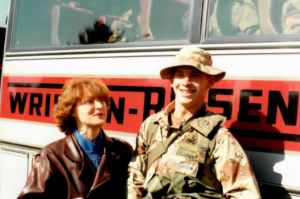
With Alpha company now reestablished in Germany, everyone was permitted to take leave. Eric returned to Peoria for five weeks and had a great visit with his parents and brothers and sisters, even marching in uniform in Peoria’s 4th of July parade together with the local Vietnam veterans. He also enjoyed a little too much fast food and drank lots of beer, so when he returned to Germany, he was out of money and even more out of shape. Making matters worse, he had erroneously booked his airline ticket to return one day late. Rather than simply asking his command to approve an extra day of leave, he called his command on the way back and said his flights had been delayed. He then disposed of the tickets upon his return and thought all was well.
At his first company formation after being back from leave, Eric did something old-timers will tell you never to do. When the company asked for five volunteers without telling them what they were volunteering for, he raised his hand. To his surprise, the five volunteers were given a five-day Alpine adventure at Berchtesgaden, the site of Adolph Hitler’s Eagle’s Nest during World War II and now the home of a U.S. Armed Forces resort and recreation center. Not only did Eric and his lucky compatriots enjoy the Alps, but Eric also had the opportunity to visit Salzburg, Austria, and see Mozart’s piano.
While Eric was enjoying the Alps, trouble was brewing in Garlstedt. A new captain had assumed command of Alpha Company and he wanted to establish discipline from the start. When Eric returned from Berchtesgaden, the captain directed Eric to produce the airline tickets showing he was scheduled to return from Peoria on time. Since Eric had discarded the tickets, the captain had no way to tell whether Eric had told the truth about his delay, but he suspected Eric was lying. Unable to prove anything, the captain dropped the matter, or so Eric thought. Then, when promotions from private (E-3) to specialist (E-4) were announced, everyone eligible was on the list except Eric. Eric saw it as an appropriate response to the inappropriate way he had handled his one-day delayed return from leave. It was a lesson he would never forget.
A couple of months later, Eric was assigned to check-in soldiers at the chow hall. He knew it was an E-4’s job and he was still an E-3, but he didn’t question the assignment. When he arrived at the chow hall, the sergeant in charge told him he couldn’t do the job because he was a private. The sergeant also told him the paperwork he had showed Eric was an E-4. At that moment, Eric realized his command had been withholding his promotion. Unable to work as he had been instructed, Eric immediately reported to his First Sergeant (E-8) and said the chow hall would not allow him to check-in soldiers as assigned because he was an E-3. The First Sergeant got the captain and they promoted Eric on the spot to E-4. Then they sent him back to the chow hall to complete his assignment. Eric’s command finally considered the delayed return issue resolved.
The rest of Eric’s time in Germany was anticlimactic. Eric and another soldier travelled to Munich and spent a week at the Oktoberfest, where they put their Desert Storm maxim “one or two or twelve beers” to good effect. He also worked at his adopted German family’s farm whenever possible and trained with the unit at Grafenwoehr. Then an opportunity arose in the latter part of 1991 for Eric to request an early discharge. His enlistment was scheduled to end on August 15, 1992, but that would make starting college in the fall hard. Accordingly, he requested and received permission to be discharged six months early on February 25, 1992, as part of the Army’s post-Desert Storm drawdown, which also coincided with the deterioration and eventual dissolution of the Soviet Union in December 1991. Convinced Russia alone would not be a threat and yearning to cash in on a “peace dividend”, the United States inactivated the 2nd Armored Division in the summer and fall of 1992 and turned the Lucius D. Clay Kaserne over to the German government.
With his early out approved, Eric returned to the United States and was discharged on February 25, 1992, at Fort Dix, New Jersey. When he arrived back home in Peoria later that same month, the high school buddy who recommended Eric join the Army and request an assignment in Germany was there to greet him, closing a circle that began when Eric enlisted in the spring of 1989. Since college would not begin until fall, Eric intended to work until then, but Caterpillar was on strike and no one was hiring. Although he applied for many jobs, the only interview he got was a from a gas station where the attendant had been killed the night before. Needless to say, he declined.
Eric had, however, joined the Army National Guard at the time of his discharge from the regular Army and affiliated with an infantry company in Peoria. The experience got off on the wrong foot when on his first day, a sergeant challenged him for wearing his 2nd Armored Division patch over his heart rather than where all other divisional patches were worn – on the left shoulder. Despite that initial confrontation, the patch came in handy when the unit was sent to the National Training Center near the Mojave Desert in California for desert warfare training. While there, Eric was assigned to KP (“kitchen police”), washing dishes outside in the desert from sunup to way past sundown. Then Eric discovered a Sergeant First Class (E-7) he remembered from Garlstedt ran the KP. When the Sergeant First Class saw Eric’s 2nd Armored Division Hell on Wheels patch, Eric’s KP assignment became serving as an aide to the officers in the in the air-conditioned officer’s tent, making sure there was always hot coffee. Eric is proud to say he performed his aide duties superbly! Eventually, Eric and his National Guard unit parted ways, thus ending Eric’s military service.

Eric enrolled at Illinois State University in the fall of 1992 using his GI Bill, Army College Fund, and Illinois Veterans Grant program benefits. Over Christmas break that first year, he visited the soldier in Oklahoma who had taught him to shoot and then headed north to visit another Army buddy at Fort Riley, Kansas, the home of the Big Red One. While there, Eric met retired Army Colonel Robert Altman, a Vietnam-era infantry officer who knew General Jerry Rutherford, the Commander of the 2nd Armored Division (Forward) in Garlstedt while Eric was there. He also knew General Rutherford had served as the Assistant Division Commander (Forward) of the 1st Infantry Division during Operation Desert Storm. After hearing of Eric’s experience in the 1st/41st Infantry Regiment during Desert Storm, Colonel Altman showed Eric a recorded episode of the Phil Donahue Show focusing on friendly fire incidents. It was the first time Eric had seen one of the soldiers he had served and trained with who had been severely injured during the one of the friendly fire incidents in Iraq. Recognizing it was an emotional moment for Eric, Colonel Altman asked his wife to allow him and Eric to have some time alone.
Eric graduated debt free in 1996 with a bachelor’s degree in history. He then began his career in human resources, parlaying the lessons he’d learned about leadership and treating people with dignity and respect into a successful career. Even more important, in 2007 he met his future wife, Lan, and they were married in 2008. They have three children and live in Champaign, Illinois, where Eric works for University of Illinois System Human Resource Services. As he looks back over his military service, he considers it his greatest honor to have served with his brothers in the 1st/41st.
Voices to Veterans is proud to salute Specialist Eric Ferguson, U.S. Army, for his outstanding service as a member of Alpha Company of the 1st Battalion of the 41st Infantry Regiment. He served with distinction during Operation Desert Storm, helping defeat Iraq’s invasion of Kuwait and liberating the territory of a key U.S. ally. Moreover, his focus on human dignity prevented the loss of innocent lives. We thank him for all he has done for our country and salute him for his service.
If you enjoyed Eric’s story, please sign up for the Voices to Veterans Spotlight monthly newsletter by clicking here. Once each month, you’ll receive a new written veteran’s story and a new podcast directly in your mailbox. Best of all, it’s free and you can unsubscribe at any time.
